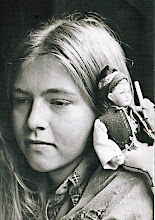

Bar-le-Duc
Monday
Dear K.
Here is the street I live on just around the corner opposite the clock. I am coming to Paris Friday for Monthly Mtg. + I hope to see thee, can thee ask Mrs. Shewell if there will be a place for me at the Brittanique for over Friday night. I return Saturday I suppose. I saw R. the other day but I suppose he has already told thee. Love from Ruth.
The reference to monthly meeting and use of the pronoun thee make me think that Ruth was a Quaker. There are still Quakers (members of the Society of Friends) who use the pronoun thee, though it is increasingly rare. While it may seem overly formal and antiquated today, it was originally used by Quakers because they rejected the use of separate pronouns as a way of setting people apart. At the time, people of nobility were addressed with a plural pronoun (you) and servants were addressed with a singular pronoun (thee). This distinction went against Quaker beliefs, so they used thee for everyone. Over time, common usage shifted to you, and the Quaker use of thee then seemed outdated.
Note: Next time you're reading Shakespeare, be on the lookout for possible double meanings in his use of you and thee.
I realize now that I focused on the card's message and didn't say a thing about Bar-le-Duc itself. The town of Bar-le-Duc is the capital of the Meuse department in northeastern France, about 147 miles from Paris. Bar-le-Duc has many beautiful 16th-century houses and is divided into an upper town and a lower town. It is particularly well known for its currant preserves (red and white) and has been for hundreds of years. The currant preserves are very expensive, in part because they use goose quills to individually remove the seeds from each currant. You can buy many different kinds of currant jam at Dean and Deluca for $5 and under (for 12 ounces), but the Bar-le-Duc preserves will set you back $44 for 3 ounces.















Fascinating, the kind of street I love to stroll.
ReplyDeletegreat card...the figure to the left in the background also looks as if he's posing for the shot! happy PFF!
ReplyDeleteChristine, you are a refined deltiologist... :)
ReplyDeleteParticularly interesting background information.
ReplyDeleteThe street itself is similar to streets as they were on Portland in Dorset (England).
Lucy
I love that type of street too, curving on a hillside- the clock tower gives a focus, but who knows what mystery awaits around the bend! I only hope the intervening century has seen some trees planted to make it perfect... By the way, any idea why these English speaking Quakers were residing in France?
ReplyDeleteSo glad you asked!
ReplyDeleteThe Quakers, through the American Friends Service Committee, were instrumental in providing post-war relief services throughout Europe, including care of war orphans (see post from November 19, 2009: http://postcardparadise.blogspot.com/2009/11/save-french-orphans.html)